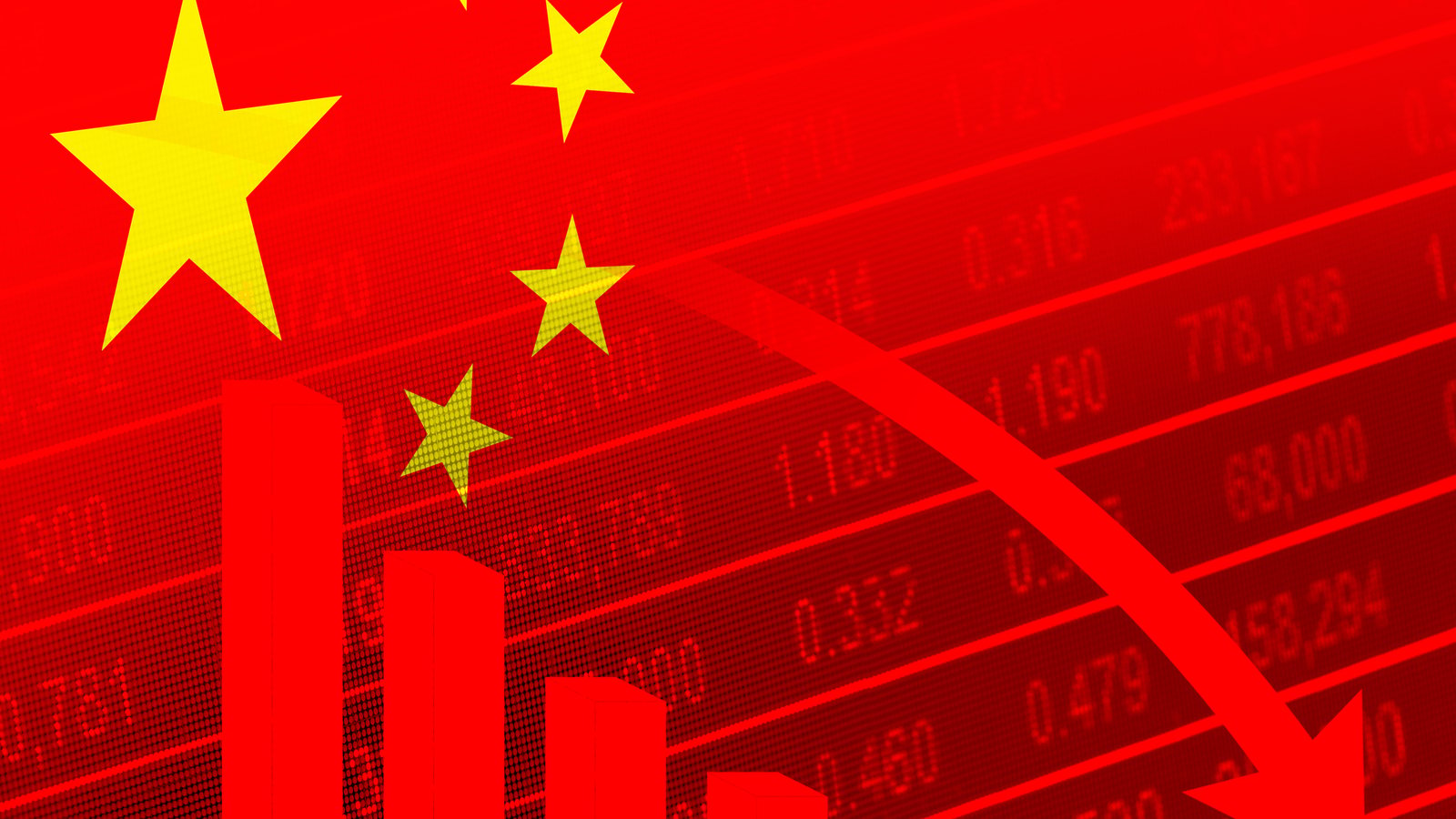- Some Chinese stocks have generated the occasional pop, but the risk-reward is skewed bearishly.
- Alibaba (BABA): China’s flagship has been plunging for the better part of the trailing year.
- JD.com (JD): JD.com is now reflecting consumer weaknesses pinged earlier this year.
- Ping An Insurance (PNGAY): Ping An is a worryingly exposed company, especially for an insurance company.
- Tencent (TCEHY): Tencent may suffer as consumer sentiment there declines.
- Nio (NIO): NIO is among the Chinese stocks to avoid as industry oversaturation becomes problematic.
- Longfor Group (LGFRY): With China storing 70% of its wealth in real estate, a crash could be on the horizon.
- China Southern Airlines (ZNH): China Southern Airlines is struggling against a terrible tourist spending backdrop.

With global recession fears rising as risk-off sentiment dominates the capital markets, it’s worth considering paring your portfolio. One area to focus on is Chinese stocks to sell now.
For years, the world’s second-largest economy represented a boon for astute, forward-thinking investors. While geopolitical tensions have always been high, ideologically agnostic folks recognized China’s upward trajectory.
However, as the Wall Street Journal pointed out in December of last year, the country’s economy has slowly been melting down across pivotal sectors. Recent volatility only confirms that investors need to be serious about which Chinese stocks to sell.
Specifically, real estate points to a significant vulnerability, with the WSJ noting that this segment “represents around 30% of the Chinese economy, nearly twice the levels that led to the financial crisis of 2008-09 in the U.S., Spain and England.”
The nation’s consumer economy appears to be weakening as well, with s dour sentiment bolstering the argument for Chinese stocks to sell.
| BABA | Alibaba | $86.48 |
| JD | JD.com | $51.53 |
| PNGAY | Ping An Insurance | $11.84 |
| TCEHY | Tencent | $45.14 |
| NIO | Nio | $14.55 |
| LGFRY | Longfor Group | $48.43 |
| ZNH | China Southern Airlines | $25.00 |
Alibaba (BABA)

Alibaba (NYSE:BABA) is significant not only for its business success and massive footprint but also because it is the pride and joy of the nation. So, the fact that BABA has dropped more than 23% year to date is hardly a good sign for Chinese stocks.
Worse, the company’s shares have been on a downward trek for most of the trailing year, where it has tanked around 59%.
While you can point to BABA as a discounted opportunity on paper, fundamentally, it could be a case of attempting to catch a falling knife. Like the U.S. and other developed nations, consumer sentiment has been a rocky area for the Chinese economy.
Of course, you can’t factor out the coronavirus-fueled lockdown of major cities like Shanghai out of the equation. Such stark actions don’t occur in a vacuum, as BABA has proven. With so many headwinds, you can consider this one of the Chinese stocks to sell (or at least heavily trim) now.
JD.com (JD)

Another major player among Chinese stocks, JD.com (NASDAQ:JD) achieved significant success thanks to its massive e-commerce business.
However, the COVID-19 crisis along with the resultant draconian governmental policies has taken its toll. JD stock doesn’t look like the winner it once was. On a YTD basis, shares are down nearly 25%, reflecting mounting concerns among investors.
Adding to the woes, the Securities and Exchange Commission recently revealed that JD is among more than 80 companies that the regulatory agency is targeting for possible delisting from U.S. exchanges if they aren’t more transparent with their financial accounting.
In my view, such a threat could be the least of JD.com’s problems. Essentially, if consumer sentiment in China doesn’t improve, whether JD stock is listed or delisted becomes irrelevant. Investors will find a way to buy stocks they believe in.
But right now, circumstances don’t look too hot for JD or other retail-related Chinese stocks. Therefore, this is another one to avoid.
Ping An Insurance (PNGAY)

Since the beginning of this year, Ping An Insurance (OTCMKTS:PNGAY) has declined almost 18%. Over the trailing year, shares are down over 44%.
What’s particularly worrisome is that Ping An appears to have lost credibility with investors. Shares are trading well below key technical support lines, suggesting they have further to fall.
Fundamentally, investors should note that the company’s troubles have been signaled for several months. In October of last year, Reuters reported that Ping An — China’s largest insurer by market value — “posted a 31.2% fall in third-quarter net profit” because its “premium income shrank on a weak economy and profit was dented by losses on investment assets.”
The economic backdrop does not appear to be improving for PNGAY.
Tencent (TCEHY)

Tencent (OTCMKTS:TCEHY) occasionally prints positive numbers, possibly lulling investors into misguided confidence. For instance, TCEHY stock popped more than 5% last week, a very respectable performance considering worldwide volatility.
On paper, the multinational technology and entertainment conglomerate appears to be on the right track.
However, the few good moments don’t make up for a broader profile that is steadily becoming worrying. Tencent is down more than 22% year to date and down more than 44% over the trailing year.
Fundamentally, the main issue for Tencent is China’s weakened consumer economy. It’s a circumstance analysts have been warning about since well before the recent downturn.
One bad signal was that Chinese consumers were starting to become thrifty, posing challenges for growth targets. Now that we may be looking at a global recession, folks will likely abandon TCEHY.
Nio (NIO)

Nio (NYSE:NIO) was one of the best Chinese stocks to buy prior to the meltdown. On a YTD basis, NIO is down a staggering 56.5%, trading just a hair lower than it was this time last year.
That doesn’t just happen because investors are being irrational.
To be fair, some positive data exists. For instance, while China’s auto sales plunged 48%, EVs performed strongly. At the same time, China’s EV investment drive risks veering into overcapacity, according to a headline from Nikkei Asia.
The main concerns for EVs in China apply to almost everywhere else: expensive products combined with still-developing infrastructure.
We also must factor in that if EV growth were to be sustained, it will cause massive water consumption due to lithium mining operations. China is running out of water, though. So this is a dance with the devil, one that Nio probably can’t afford.
Longfor Group (LGFRY)

Theoretically, Longfor Group (OTCMKTS:LGFRY) should be one of China’s most promising investments. A company specializing in real estate matters with an emphasis on property management, Longfor has been one of the beneficiaries of China’s meteoric economic growth.
However, recent developments have revealed major cracks in this narrative.
According to a Fortune.com article, China stores 70% of its wealth in real estate. This kind of exposure, which may have been encouraged during the go-go period, is now a potential liability.
It reminds investors about the rise and fall of Japan’s Nikkei 225 index, which was in large part fueled by real estate speculation. This is a case of deja vu that you’ll want to avoid.
Even if the exact numbers are a bit off, with so much leverage tied to real estate, any other problems can create a domino effect. Here, I don’t think it’s wise to play hero, particularly with so many headwinds at work.
China Southern Airlines (ZNH)

China Southern Airlines (NYSE:ZNH) is down nearly 17% year to date and nearly 25% over the last year, and things could keep getting worse.
China attracted a sizable tourism industry over the years, but the Covid-19 crisis sharply changed perceptions. Imposing a draconian zero-Covid policy, the Chinese government has been among the strictest regarding the pandemic, but at the cost of crippling its tourism industry.
Measuring $1.5 trillion in valuation according to the South China Morning Post, tourism is a big deal in the most populous nation on Earth.
With hardly any end in sight in terms of the pain, it’s time for investors to add ZNH to their list of Chinese stocks to sell now. This isn’t about hating on a particular company. Rather, with a smaller demand profile to work with, ZNH is likely to face continued volatility.
According to a Bloomberg report, tourism spending declined 43%, with many folks choosing to stay home during a “labor day” holiday. Lacking a credible upside catalyst, ZNH is at the mercy of a very unforgiving market backdrop.
On the date of publication, Josh Enomoto did not have (either directly or indirectly) any positions in the securities mentioned in this article. The opinions expressed in this article are those of the writer, subject to the InvestorPlace.com Publishing Guidelines.
